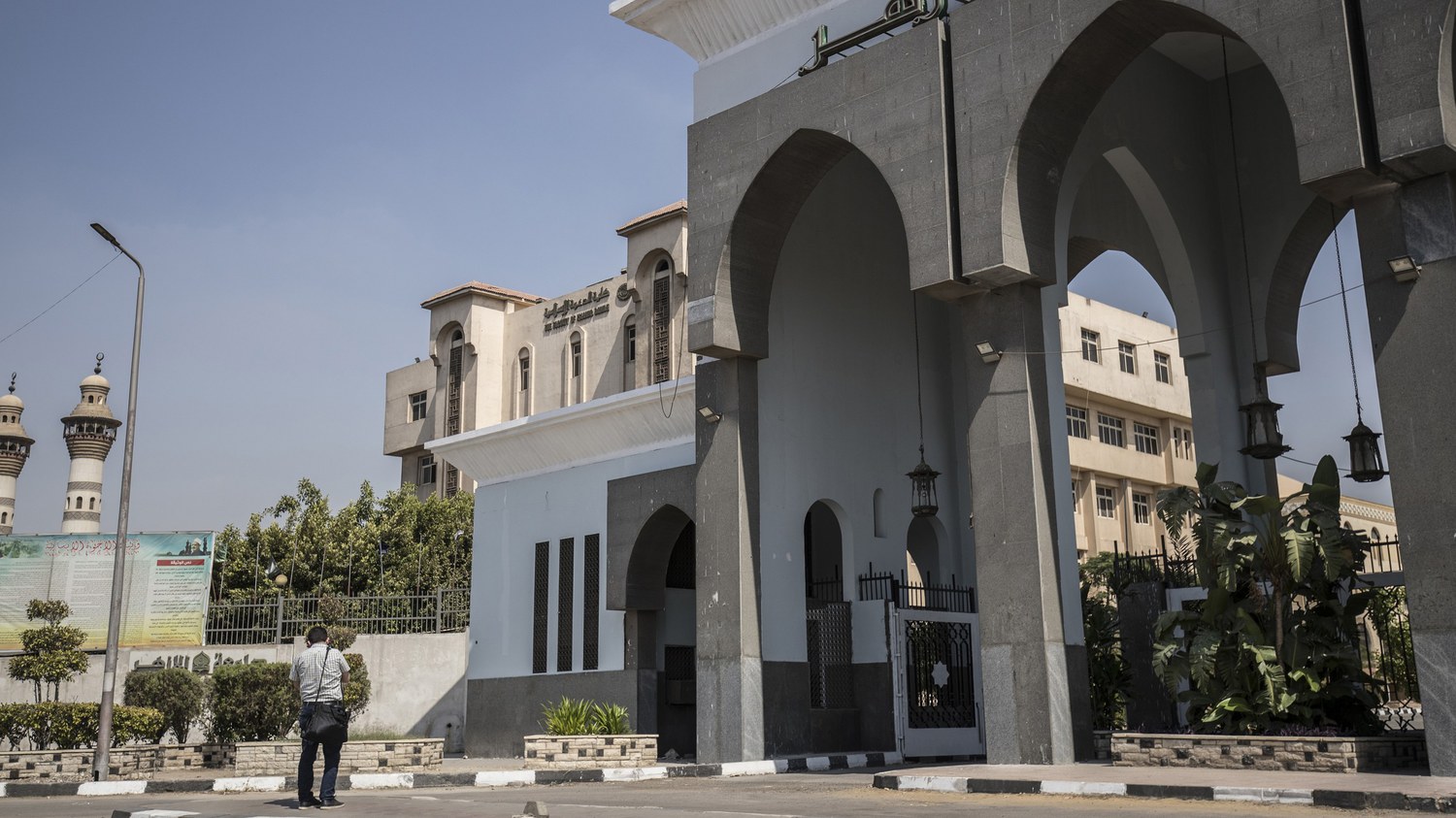A young Uyghur man has been confirmed imprisoned after being forced to return to northwest China’s Xinjiang Uyghur Autonomous Region (XUAR) for the “crime” of having studied abroad in Egypt, according to official sources.
Bakihaji Helil was handed a nine-year prison sentence in 2017 after returning home to Atush (in Chinese, Atushi), a county-level city of around 270,000 people that is the capital of Kizilsu Kirghiz (Kezileisu Keerkezi) Autonomous Prefecture in the cotton- and grape-growing region of southwestern XUAR.
The young man was among nearly 5,000 Uyghur students who were ordered back to the region from Egypt, where he was enrolled at Al Azhar University in Cairo, an independent researcher based in Turkey named Abdureshit Niyaz, who had previously lived in the North African nation, recently told RFA’s Uyghur Service.
Repatriated as China ramped up repression in the region through a policies aimed at suppressing expression of religious and ethnic identity, many of the returned students were reportedly jailed soon after their arrival, although their sentences and locations have yet to be confirmed on any large scale.
According to Niyaz, Helil had become interested in religious education back in Atush through his interactions with local religious leaders. For a period, he undertook his own religious education by listening to Qur’anic recitation in mosques and sermons at weddings and funerals, as well as visiting with and learning from local religious leaders. Seeing this, his father decided to send him to Egypt so that he could fulfill his dreams of studying religion more formally and systematically.
However, not long after sending his son to Egypt, the father became a target of frequent visits and questioning at the hands of the neighborhood police and neighborhood committee in their hometown. The father reportedly explained to police that he had chosen to send his son to study at Al Azhar University, rather than a Chinese university, because the tuition was low and because they didn’t put any restrictions on ethnicity or numbers of students.
His comments aroused the police’s suspicions that he was “opposed to national education” and posed a “danger” to the country.
Niyaz said the police threatened to cause ongoing problems for Helil’s entire family if their son did not return immediately from Egypt. As a result, Helil returned to Atush at his father’s request at the end of 2016.
According to Niyaz, Helil was among six students he knew personally that were sent to prison by Chinese authorities after returning to the XUAR from Egypt. The five others—Abdughappar, Mamatjan Abdushukur, Adiljan Arkin, Abdusalam Wali, and Elijan Qari—all received sentences of between seven and 12 years, he said, although he was unable to provide further details about their status.
He said Helil is currently serving his term in Qara Bughra Prison in Kunes (Xinyuan) county, in the XUAR’s Ili Kazakh (Yili Hasake) Autonomous Prefecture.
Forced to return
RFA spoke with a “stability” officer in Atush who confirmed some of Niyaz’s account of the students’ jail sentences.
“[A police officer] said the young man was sentenced to prison,” he said, when asked about Helil.
However, he was unable to provide any more information about the young man’s situation.
“I haven’t spoken with the police about this [and] I haven’t been involved in the case,” he said.
A security officer in the city told RFA that authorities had carried out “ideological work” on Helil’s family to convince them that he should return home from Egypt.
“We told them it would be great if they could bring him back, that we had things to talk about with him, and they brought him to us within four days [for an initial interrogation],” he said.
The officer said Helil was detained “seven or eight days after he came back from Egypt” and was sentenced to prison in 2017, without providing further details.
RFA spoke with an official from a neighborhood committee in Atush with jurisdiction over Helil’s household while she was in the XUAR capital Urumqi receiving recognition for being among local-level cadres and others who convinced students and other Uyghurs to return to the XUAR from abroad.
She acknowledged that she had helped get Helil to return to the region, noting he had been in Egypt at that point “for a year or so.”
“He was inspected in Atush, and he was sentenced here … to nine years,” she said, adding that Helil is “in the prison called Qara Bughra.”
When asked what kind of help the neighborhood committee has offered to Helil’s family in the wake of his detention and imprisonment, the official said that the young man has been permitted to “see” his relatives virtually and write letters on several occasions, citing these actions as evidence of “care.”
Egypt is among several countries blacklisted by authorities for travel by Uyghurs because of a perceived threat of religious extremism, and RFA has documented several instances where people have been detained for overseas visits or maintaining ties abroad.
Beginning in early July 2017, more than 200 Uyghurs, many of them religious students at Al-Azhar, were detained in Egypt after being rounded up in restaurants or at their homes, with others seized at airports as they tried to flee to safer countries, sources said in earlier reports.
Dozens were then deported back to Xinjiang, where rights groups said they faced a serious risk of arbitrary detention and torture, while many who had earlier gone home on their own in response to a Chinese government order to return for “registration” were also taken into custody.
Arbitrary sentences increasing
Reports of Helil’s sentencing came as a new report by New York-based Human Rights Watch (HRW) found that Chinese courts have arbitrarily sentenced hundreds of thousands of Uyghurs and other Muslim minorities to lengthy jail terms in increasing numbers since the launch of a “counter-terrorism” campaign in the XUAR.
On Wednesday, HRW said that since the Chinese government escalated its repressive “Strike Hard Campaign against Violent Terrorism” in late 2016, the region’s formal criminal justice system had convicted and sentenced more than 250,000 people.
Based on analysis of nearly 60 of these cases, HRW found that many people have been convicted and imprisoned “without committing a genuine offense,” noting that such formal prosecutions are distinct from those that have resulted in people being arbitrarily detained. Authorities in the XUAR are believed to have detained up to 1.8 million Uyghurs and other Muslim minorities in a vast network of internment camps since early 2017.
“Although the Chinese government’s use of ‘political education’ camps has led to international outrage, the detention and imprisonment of Xinjiang’s Muslims by the formal justice system has attracted far less attention,” said Maya Wang, HRW’s senior China researcher.
“Despite the veneer of legality, many of those in Xinjiang’s prisons are ordinary people who were convicted for going about their lives and practicing their religion.”
HRW cited official statistics as showing “a dramatic increase” in the number of people sentenced in the XUAR in recent years with 99,326 in 2017 and 133,198 in 2018. Authorities have not released sentencing statistics for 2019, but HRW said that the Xinjiang Victims Database—an NGO that has documented the cases of over 8,000 detainees based on family accounts and official documents—estimates that the number of people sentenced in 2019 may at least be comparable to those in the previous two years.
Prior to 2017, sentences of over five years in prison were about 10.8 percent of the total number of people sentenced. In 2017, they make up 87 percent of the sentences, HRW said.
“International pressure on the Chinese government should be escalated for an independent investigation in Xinjiang,” Wang said. “That’s the best hope for the release of all those unjustly detained or imprisoned.”
Reported by Shohret Hoshur for RFA’s Uyghur Service. Translated by the Uyghur Service. Written in English by Joshua Lipes.



